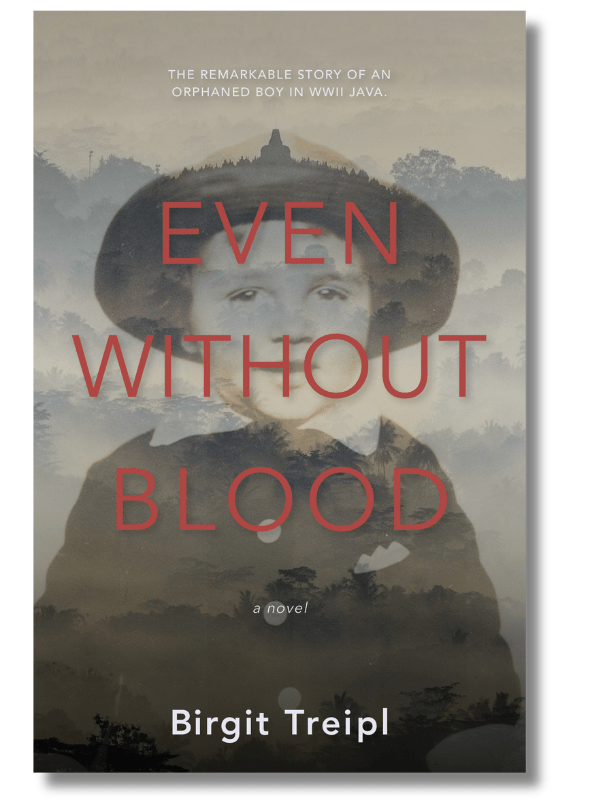Even Without Blood
by Birgit Treipl
Genre: Literary Fiction / Historical Fiction
ISBN: 9781068930508
Print Length: 320 pages
Reviewed by Peter Hassebroek
A novelized true story about an Austrian boy and his family impacted by WWII in the Dutch East Indies
The prologue opening Even Without Blood establishes a biographical foundation, including real names for many characters, for this captivating and intimate work of historical fiction.
Victor “Bubi” Treipl’s story begins in 1938 at the family owned and operated (and still existing) Grand Hotel Lembang in Bandung, West Java. A somewhat introverted eight-year-old, Victor is home-schooled along with two other students by a tutor in the hotel. The ones in charge are Papi, his father, and Aunty Hilda, while his adored mother occupies a lesser role.
While primarily contained within the hotel grounds, other family members and local servants are always around, so Bubi’s life is rich with human contact. He only becomes aware something’s amiss after explaining his domestic dynamic to Missy, his teacher, and she demonstrates an interest in how things are organized at his home.
This mystery has to wait for Victor (and the reader) because the family’s contented bubble is about to burst. First by the successive tragic deaths of his parents to illness, then World War II. Being Austrian equates to being German in the Dutch East Indies; therefore, when Germany attacks Holland in 1940, Victor and his family are classified as enemy civilians.
Victor is expelled from the Dutch school he had recently enrolled in, just as he was making new friends. More traumatically, the beloved family hotel is seized and entrusted to a scheming, caretaker manager. The family is interned and separated, putting Bubi and his aunt in the hands of successive authorities.
First it’s the Dutch, and then the Japanese. After the war, they must contend with freedom fighters, communists, and the Dutch again during the revolution (bersiap) of an unstable country that eventually became Indonesia.
In parallel, Victor is developing his will and independence in his adolescence. This leads to conflicts with his aunt as their priorities diverge and learning the family truths he was too young to grasp before.
The only constant over the years is that each new environment is hostile in one way or another, requiring constant alertness and necessitating difficult decisions to survive. Good fortune too, as when Victor and his best friend go to a city to barter.
The elements and research are impressive, coming together to create a story both personal to the author/daughter and still holding universal appeal. Narrating from a growing child’s perspective opens up the dramatic irony to infuse mystery and other plot elements to turn what could be an interesting but conventional biography into something much richer.
I found the infusion of a fourth-wall breaking interviews with the real Victor an unusual choice. An intimate way of honoring the source, perhaps, or to affirm the novel still being tethered to reality, but it feels more like narrative interruptions, even if the adult perspective is useful.
Victor’s experiences are extraordinary but never sound implausible or exaggerated. His voice is natural and sincere, even seeming to mature in tune with his getting older. Along with the use of the present tense and observational detail, it brings the reader close to the lush, exotic surroundings while also revealing the breadth of global conflict. Particularly how the lines between ally and adversary can fluctuate and weave.
In Even Without Blood, Treipl successfully weaves biography and history into a compelling coming-of-age story.
Thank you for reading Peter Hassebroek’s book review of Even Without Blood by Birgit Treipl! If you liked what you read, please spend some more time with us at the links below.
The post Book Review: Even Without Blood appeared first on Independent Book Review.
